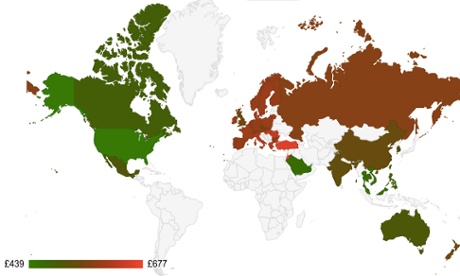For years the Pew folks have been yelping about “isolationism.” They’ve been telling us it’s on the march — except among the elites — with the strong implication being that this is not a Good Thing. But do they know what the heck they’re talking about?
One has to wonder what extending peaceful commercial links with other nations has in common with invading them, meddling in their internal politics, or otherwise bullying them around. Indeed, establishing voluntary non-coercive relations with other nations — otherwise known as international trade — is the polar opposite of military and/or political intervention in their affairs. The American people know this. The Pew folks — not so much.
The bias of the Pew Center is evident in every line of the report, and also in its structure: the Pew Poll is really two polls, one a survey of the hoi polloi (you and I), the other a poll of members of the “internationalist” Council on Foreign Relations (CFR), the elite foreign policy group founded by Elihu Root and dominated by the Morgan banking interests from the get-go. The gulf between us plebeians and the Very Serious People in Washington (and New York) has been growing for years, but today it is a vast chasm: The CFR types are aghast at the “isolationism” of the rest of us, and ascribe to this various causes: “war fatigue,” the costs — and of course our narrow plebeian “isolationist” anti-cosmopolitan country-bumpkin outlook.
While 51 percent of normal Americans say we’re pushing our weight around far too much, the exact opposite opinion is held by the Washington-New York know-it-alls: “By contrast, about twice as many CFR members say the US does too little internationally as say it does too much (41% vs. 21%); 35% say the US does the right amount.” While us Normals were overwhelmingly opposed to US intervention in Syria, the CFR’ers were for it 2-to-1. Yes, they’re wrong about practically everything, including what it means to be an “isolationist” — a creature that has never existed and could not exist outside of North Korea.
[…]
The political class in this country has a far different view of commercial relations between nations than the Average American. To the latter, it is simply Good Old American Free Enterprise, albeit engaged in overseas. The former are not so naïve: they realize it is all about buying political influence, and, failing that, using the US military to guarantee the safety, security, and profitability of American investments abroad.
Viewed through this lens, American foreign policy since 1890 takes on a whole new dimension, which Rothbard’s Wall Street, Banks, and American Foreign Policy reveals in scintillating detail. The One Percent have been utilizing the US military as their private security force ever since that time: indeed, every war we have fought — yes, including the Good War — was fulsomely supported by the economic elite and their journalistic camarilla against the overwhelming desire of the American people to stay out. The political class has deliberately conflated commercial contacts with military and political intervention into the affairs of other nations — because, for them, the two are synonymous.
According to the mindset of the Pew Center and their good buddies at the CFR, “isolationism” has to mean commercial isolation. While this may puzzle the average person, look at it from the perspective of a professional thief: without the threat of US sanctions and the ultimate bludgeon of US military intervention, how else will the big banksters and their sycophants enforce a “world order” that exists so they can make a fast buck off the sweat of Chinese coolies, Eurasian oil workers, and Mexican maquiladores?




